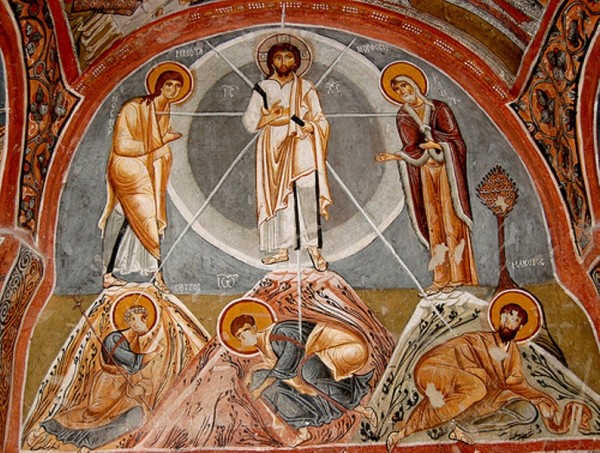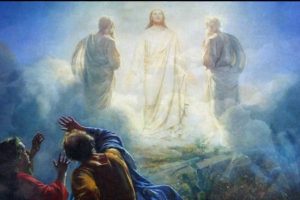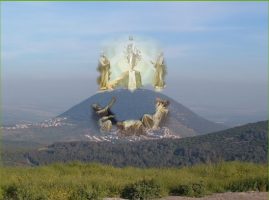During the earthly life of the Lord Jesus Christ, there were very few joyful, luminous moments. God was Incarnate and came into this world above all in order to plunge into our darkness and to share our sorrow and everyday human existence. It was for this reason that the Lord Jesus Christ spent so much time among sinful people who were in need of purification, enlightenment, and salvation. It was for this reason that the Lord chose for Himself the way of the Cross, suffered for people, was rejected by them, accepted spitting and disgrace, and died on the Cross and descended into Hades, so as to fill with His Divinity and light all the space where evil had reigned before His coming.
In the Gospel there are recorded only a few cases in which Christ’s Divinity was visibly revealed to people. For example, this took place during the Baptism of Jesus, when the voice of God sounded forth from Heaven: “This is My beloved Son, in Whom I am well pleased” (Matthew 3:17). Another such moment – and this is what we commemorate today – was the Transfiguration, when the Lord, taking three of His closest disciples, ascended a high mountain with them and, when He prayed, “His face did shine as the sun, and His raiment was white as the light.” And the voice of the Father again sounded forth: “This is My beloved Son… hear ye Him.”
While the vision was still underway, one of his disciples, Peter, said: “Lord, it is good for us to be here: if Thou wilt, let us make here three tabernacles; one for Thee, and one for Moses, and one for Elias” – for Moses and Elias appeared to Jesus and spoke with Him about His departure, that is, about His death on the Cross (Matthew 17:1-9). The Apostle Peter’s words were the natural human reaction to God’s presence, to His sudden appearance, to His unexpected, luminous visitation from above. “It is good for us to be here” – that is, it would be good if all this continued, if this moment of glory and light never ended. But after the ascent of Jesus upon the mount came his descent therefrom, when He was met by the possessed youth and many other people in need of healing. After descending from the mount, the Lord was once again plunged into our human darkness, in order to share it with us. And then came the Garden of Gethsemane and Golgotha.
Each one of us passes through different states. Sometimes we are on Thabor, and sometimes we find ourselves on Golgotha. Sometimes the presence of God is so palpable and clear that we would like these minutes never to end, to last forever. But sometimes God, as it were, withdraws from us, leaving us in darkness, alone with ourselves, with our problems and sins. But in such moments it is especially important to remember His presence and that He enlightens our human darkness from within with His divine light.
The divine light that was revealed to the disciples on Thabor was not a material light that shone “like the sun,” but was the Uncreated Light, it was God Himself, the very presence of God, the energy of God – the divine action, a visitation from above, in which the glory of God is revealed to man. And this light shone not only on the disciple on Thabor, but also revealed itself to many people, many saints, including St. Gregory Palamas and St. Symeon the New Theologian. And among our contemporaries there are people who have beheld the divine light. The Elder Archimandrite Sophrony of blessed memory was repeatedly found worthy of witnessing the divine light, which was for him not only a revelation of God’s glory, but transfigured him from within.
But why does the Lord visit us with His divine light? Not just to flash forth brightly, then quickly disappear, leaving us in the darkness. The Lord visits us so that, having beheld His light, we might because permeated by it, that our whole life might change, that there might take place with us that of which the Lord Himself spoke: “Let your light so shine before men, that they may see your good works, and glorify your Father Which is in Heaven (Matthew 5:16). The divine light visits us to transfigure not only everything around us, but our own lives as well, that we might change, and that the light of God might begin to spread to other people through us.
It is for this reason that the Church celebrates the Lord’s Transfiguration, that it might become our own transfiguration, that the doors to the contemplation of the divine light might open to us, too – the contemplation of which so many have been found worthy over the past centuries. But in order that the light not be consumed by our human, sinful darkness, we must live in accordance with the Gospel, so that through our good deeds, through our whole countenance, people might recognize Christ. After all, people judge Christ and Christianity first of all by us, believers, members of the Church. There live around us no small number of people who might have long ago come to the Church if they had not encountered Christians on their life’s path who were not worthy of this lofty calling and who, instead of emitting Divine light and radiance, exuded the stench of sinful passions.
Let us remember that those moments of enlightenment that we experience from time to time either here in church, when communing of Christ’s Holy Mysteries, or during prayer, should allow us to change for the better, to be transfigured. Let us strive that, on the moral and spiritual plane, we might always be at the utmost level accessible to us, never falling below that very high bar that we see in the Gospel. Amen.
2000.
Translated from the Russian



















